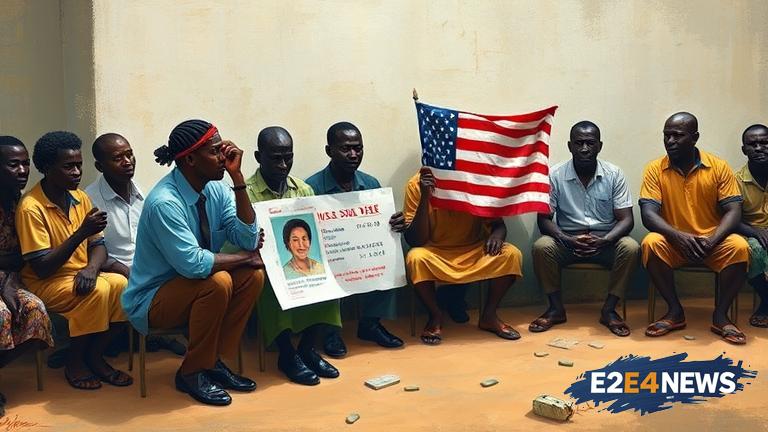The recent revelation that Zambia has been funding its own humiliation through the US visa process has sparked widespread outrage and debate. The Zambian government has been paying for the processing of US visas for its citizens, a practice that has been criticized as a form of self-imposed humiliation. This arrangement has been in place for several years, with the Zambian government footing the bill for the US visa application process, including the cost of processing, interviewing, and adjudicating visa applications. The US visa process is notoriously complex and often frustrating for applicants, with long wait times and high rejection rates. Despite these challenges, the Zambian government has continued to support the process, citing the importance of maintaining good relations with the US. However, critics argue that this practice is a form of neo-colonialism, with Zambia effectively paying for the privilege of being considered for a US visa. The financial burden of this arrangement is significant, with the Zambian government spending millions of dollars each year on US visa processing fees. This expenditure has been criticized as a waste of resources, particularly given the country’s many pressing development needs. The US visa process has also been criticized for its lack of transparency and accountability, with many applicants complaining of unfair treatment and arbitrary decision-making. The Zambian government’s decision to fund the US visa process has also been seen as a form of appeasement, with some arguing that it is an attempt to curry favor with the US at the expense of national dignity. Despite these criticisms, the Zambian government has defended its decision, citing the importance of maintaining good relations with the US. The government has also argued that the US visa process is an important tool for promoting economic development and cultural exchange between the two countries. However, many Zambians remain skeptical, arguing that the benefits of the US visa process are outweighed by the costs and humiliation involved. The issue has sparked a wider debate about Zambia’s foreign policy priorities and the need for greater economic and political independence. Some have argued that Zambia should be focusing on developing its own economy and reducing its dependence on foreign aid, rather than paying for the privilege of accessing the US visa process. Others have suggested that the government should be working to improve its own visa processes and procedures, rather than relying on the US. The controversy has also highlighted the need for greater transparency and accountability in the US visa process, as well as the importance of protecting the rights and dignity of Zambian citizens. In recent years, there have been several high-profile cases of Zambians being denied US visas, often on arbitrary or discriminatory grounds. These cases have sparked widespread outrage and calls for reform, with many arguing that the US visa process is in need of a fundamental overhaul. The Zambian government has faced criticism for its handling of these cases, with some arguing that it has been too slow to respond and too willing to appease the US. The issue has also sparked a wider debate about the impact of globalization and economic inequality on African countries like Zambia. Many have argued that the US visa process is a symbol of the broader power dynamics at play, with wealthy countries like the US exerting significant control over the movement and opportunities of citizens from poorer countries. The controversy has also highlighted the need for greater regional cooperation and integration, as well as the importance of promoting African-led solutions to African problems. In conclusion, the US visa shame has sparked a wider debate about Zambia’s foreign policy priorities, the need for greater economic and political independence, and the importance of protecting the rights and dignity of Zambian citizens. The issue has also highlighted the need for greater transparency and accountability in the US visa process, as well as the importance of promoting African-led solutions to African problems.
